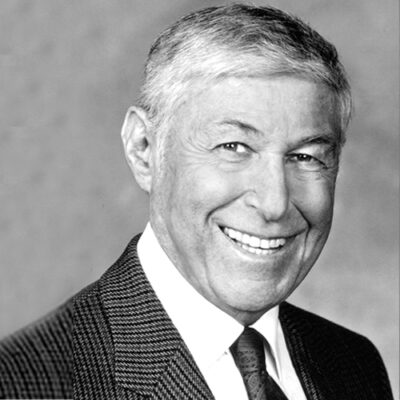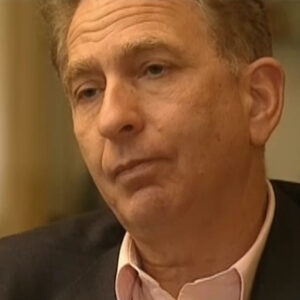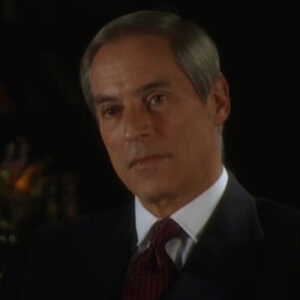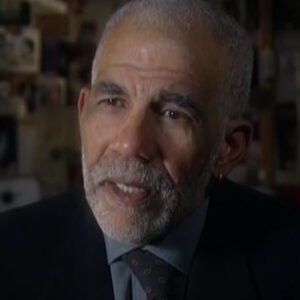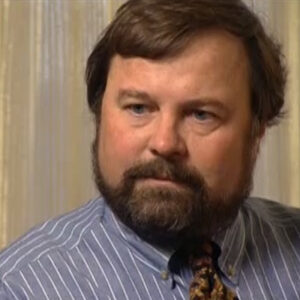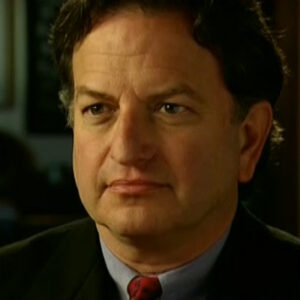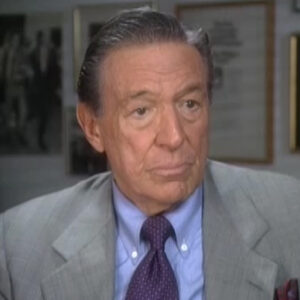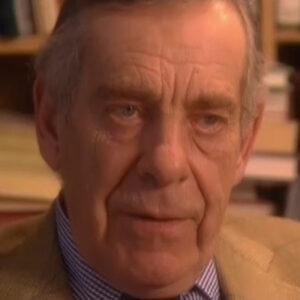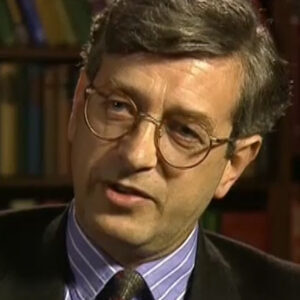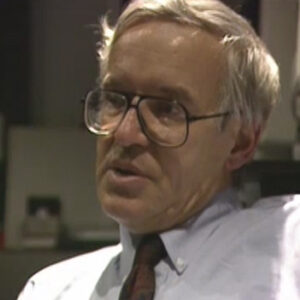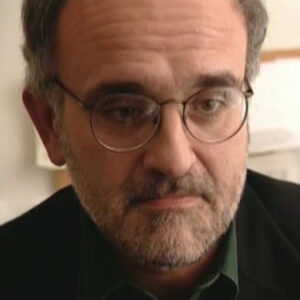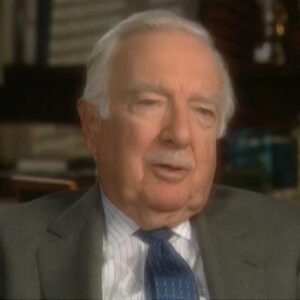Speaker Well, I’ve been working for CBS News in Johannesburg and South Africa around the operation in Johannesburg, through this through the 80s and came came to London to work for the evening news where I worked for for three or four years and got a call from somebody who I knew and had worked with Steve Kroft, who had an opening and suggested that I come and work with him. And I was absolutely delighted. And that was five years ago.
Speaker Most of the time, producers get to 60 Minutes by doing something somewhere else that brings them to their attention. What did you do with CBS Evening News that brought you to Sucrets attention?
Speaker Well, I’d worked with Steve fairly extensively in South Africa.
Speaker He had come out to South Africa when he was based in London. And we’ve done some very good work together. And and I guess he remembered that and we’d been kept in contact and he had moved on from from being on the news to West 57 Street and then being at 60 Minutes for a couple of years when he when he made his approach.
Speaker So you actually knew him when he was at CBS Evening News? That’s right.
Speaker So that’s when you developed a relationship with him. Did you grow up watching 60 Minutes?
Speaker I didn’t grow up watching television. I lived in South Africa, grew up in South Africa, in South Africa. In those days, television was a satanic form of technology, which was which was going to undermine the purity of thought of all South Africans.
Speaker So it wasn’t until 1976 that we first got television. So that was I was 20 years old at the time, and that’s when I first saw my first test pattern. So, no, I didn’t grow up watching 60 Minutes. In fact, I didn’t watch very much 60 Minutes at all until I came to until I came to London.
Speaker But 60 Minutes wasn’t even seen here.
Speaker No, but I you know, I obviously was in the bureau and watch 60 Minutes, you know, when when the show came, came, came in, I didn’t watch that much 60 Minutes.
Speaker And in fact, you know, I can’t say that I’d watched a lot of 60 Minutes when I when I joined when I joined the show. But it was stressed to me by Steve that it was something that I had to do. And I watched a lot of shows, as you know, as I started working on the show, that it was a it was a completely new form for me. And there was a lot to learn and there’s still a lot to learn.
Speaker Well, I’m curious to know, when you were growing up in South Africa, were you did you want to be a journalist? Where did you study journalism? Did you and what was your educational background and ambitions?
Speaker I didn’t really know what I wanted to do. I studied, you know, the humanities, politics, sociology, psychology, and left university being qualified to do really nothing. But I.
Speaker I then joined up with a friend and we started a film festival in South Africa’s first film festival where we brought films in from from abroad. And I got interested in film that that lasted for four or five years and decided to move on. And in fact, it’s quite a strange, strange story. I mean, we a friend of mine and I thought that we knew enough about film to to start filming things. So we bought a camera together, an old copy 16, and called up the various news film agencies and said, well, we are in Cape Town and we were available to to work for you. And they said, great, we don’t have anybody in Cape Town. So I worked for Biznews as it was then. And he worked for for Kupets and we had one camera. So we’d go out on the story and we’d have two magazines and we had furiously changed magazines and and shoot shoot for both both competitive competitors. And then fortunately the camera got stolen and with the insurance money, we bought two cameras. But I have to say that I wasn’t much of a cameraman at all.
Speaker And my my interest was far more editorial and far more I was more engaged in production and research and and really trying to tell the story as it was developed in South Africa. So so it was kind of it was kind of a progression from from being a cameraman, getting into producing.
Speaker That’s very interesting. Had you heard anything about Don Hewitt before joining 60 Minutes? And if so, what?
Speaker I just knew that he was this mythical character, this man who who had created this this extraordinary show and this extraordinary habit that people would tune in on Sunday nights in the United. States I’d never tune in on a Sunday night in the United States, and it was a great it was actually a great deal of just really exciting. First, seeing the show live as it went out on Sunday night at 7:00 because I’d seen occasional tapes, but I hadn’t seen the show as it went down. So I just knew very vaguely, you know, that there was this man who had who had created the show and who has, you know, who was somewhat of a legend. But I had no real idea of who he was and and and just how wonderful he was and what it was that he did.
Speaker Well, what was your first meeting with him? Like my first screening. Oh, for screening. Was your first meeting? Yeah. Had you heard about the screenings?
Speaker I had and I was terrified. I was absolutely terrified.
Speaker It was a story we had done on Richard Branson of Virgin, Virgin Airways and Virgin Records. And and yeah, I mean, it was everything that it was billed to be.
Speaker Tell me about it step by step.
Speaker Well, we you know, we’d done a cat, which I guess was a reasonable length. It was 16 minutes or 15 minutes. And I walked in and there were all these strangers, people that I’d never met before. They didn’t know me and I certainly didn’t know them. And that’s all digress for a moment because it’s quite remarkable, the show. It’s not as if you were interviewed by the senior producers or other, you know, other management people at the show. You basically are brought on by the correspondents themselves. And Steve had sufficient trust in me to to to hire me and give give me a go. And so these people were complete strangers. They didn’t know where I come from. I mean, they vaguely knew that I you know, they knew that I had worked for CBS in London. They didn’t really know what I was about. And I certainly was I certainly didn’t know them. I mean, they were just like half a dozen people in the screening room. And and it was pretty terrifying and just pretty terrifying. I remember I mean, Don alternated between closing his eyes, sort of glancing at the script and sort of listening. And I didn’t know what any of those signals meant. And when the lights came on again or came on, I felt, God, what is this? And they like the piece, which is a great relief. And obviously it took two or three more screens that week in New York to get it to get it right. But but it was something that I really, really didn’t know what to expect except the terror. It’s a little like being on trial as it is every time. And, you know, when one would think that it could get easier. You know, I’ve been on the show for five years, and, you know, as you do things, things get easier and screens become less problematic and less of a trial that there aren’t nothing gets easier. Each story presents its own challenges. And this is difficult to do as a long story. And clearly one learns and one’s learning all the time and one learns an enormous amount from from those screenings. But it still doesn’t make it easier.
Speaker Yeah, yeah.
Speaker Let’s talk for a second about the suicide bomber story that you did and that screen what the screening like the first screening that morning that I didn’t see.
Speaker Well, firstly, I think I should say that it wasn’t a story that any of us wanted to do. I mean, as as, you know, 60 Minutes producers and correspondents put in a putting in a proposal to do a story, and it’s either accepted or rejected. And you go off and do it when you when you get the opportunity to do so. It’s not often that you’re actually asked or told to go out and do a story. In this case, Don found time and again and said, I want you to do something on suicide bombers. And we were all very wary of doing it because, in fact, we’ve done stories which dealt with that issue before. We’d done two or three stories that that had touched on that issue.
Speaker The engineer, the engineer for one, we did a story on on on torture and whether basically the way in which the Israeli security authorities deal with the whole problem of bombings and and and how do you actually deal correctly with with the threat of bombings. So it was a story that we hadn’t you know, we hadn’t a great deal of enthusiasm for because we felt that we’d done as much as we could. I mean, it’s not an easy story to do. You know, suicide bombers, as I think we said in the in the piece or in the studio there, aren’t around to tell this story. So it didn’t fill us with a great deal. I will fill this with a degree of dread and. Included that included Bob, but Don persisted. He phoned twice a day, sometimes three times a day, asking how I was getting on, and I realized I had no choice but to get on a plane to Israel and figure out what we could do. And so he, you know, he had clearly had a very large appetite for the story. But as as it happens with most of these stories doesn’t get involved in in the story until he sees it in the screening. So we we screened it on the satellite and and he was he was blown away. I mean, the character that we that we chose and the character that we found was particularly compelling told a particularly compelling story. And and to our relief to I really don’t like that. And obviously we had to do some work is I think you came in on the second we came to the second screening.
Speaker I just wondered what the changes were between the first and second, if they were anything significant or if they were just not that, you know.
Speaker I mean, they were in fact, it’s kind of interesting because it’s interesting because Don so often doesn’t concentrate on pictures and he doesn’t he doesn’t concern himself, certainly not in the first couple of screenings with the pictures. I mean, he really does listen to the story and listen to how the story is told. In that first screening, we had put in some pictures which were kind of dark and a little bit obscure, and he didn’t it through him. He didn’t really understand what what the pictures were saying. And he said, get that out, do that, you know, do that section as an on camera. I see. I see. So that was really the only thing I remember.
Speaker He said I didn’t want those nice shots. I don’t like night shots. I don’t like nature. I mean, it’s like he has certain things that he doesn’t like.
Speaker That’s right. And those things, I mean, again, do you know what they are now? Well, I’ve never I mean, you can never guess. You can never second guess, Don Hewitt. I mean, you can think it you you know what he likes and what he doesn’t like. I mean, we happen to love those Martians that were evocative, then moody. They kind of the kind of mysterious. And they gave a sense of the, you know, this journey that this guy went on. And it was furtive and and conspiratorial. And Don just had no time for it all. He told me the story and the best way to tell the story is to do it on camera.
Speaker Well, does anyone say, Don, the pictures are important? They refer to it. I mean, just what you said to me, does one make that argument?
Speaker Do you make the arguments? And he listens, but it doesn’t change his mind. I mean, he his initial impression and his instinct. And I guess when one has to respect his instinct, his his instinct was that, you know, the audience or he in this case was searching for what these pictures were. And because they were they were so dark, they kind of distracted you from the story. So it was difficult to argue with it.
Speaker I want to I’m sorry to do this because it’s going very nicely now. But I did see about five minutes ago this person working. I’m not terribly insulted. We come back to this. He’s been such a good I mean, we’ve taken such advantage. And because he’s junior in terms of longevity here, seniority. And so we’ve now introduced, if you want to come from.
Speaker But yeah, OK, um.
Speaker From the I know that you’ve only been here at 60 Minutes for, you know, a relatively short time, but that seems to have been great. You know, he seems to have respect and trust in you. How long did it take to kind of establish this?
Speaker I think you’d have to ask Don that what did you get a sense of of it? I mean, from your perspective, I mean, no, let me rephrase the question differently.
Speaker Do you feel that Don is very, very supportive of your work?
Speaker Yeah, I’ve always felt that Dun has been supportive. But, you know, he’s he’s also he’s not sentimental.
Speaker I mean, Don knows exactly what he wants and and he knows what to expect from producers. And if you don’t produce in, I guess you’ll know pretty soon that he’s not happy. I’ve been fortunate enough to be able to to produce stuff that Don has enjoyed and appreciates.
Speaker Are you aware of the. Well, let me put the question differently.
Speaker I can’t go into another 10 percent of the relationship between a producer and a correspondent has been compared in some ways to a marriage. You’ve been married once divorced, and now you’re married again. Can you talk about the producer correspondent relationship?
Speaker Well, I mean, I just I can talk about my relationship with the correspondents that I’ve worked with. It’s I think very different correspondents have very different relationships with producers in general and then obviously have particular relationships with particular producers. I found I mean, Stephen in many ways was a mentor for me. You know, he brought me onto the show. He he really did teach me a lot about about the show and gave me an awful lot of guidance and support. And and obviously, you know, Don Don’s input when I when I came across Don in the screens was enormous. But just in terms of reporting the story, presenting the story, structuring the story, I found Steve’s input was was extraordinary. I mean, I consider him a really wonderful journalist and a great writer who’s very involved with each piece particularly involved. And I used to go across to New York and work and finish off pieces with him. And I mean, it wasn’t one line that he wouldn’t he wouldn’t he would not read a line unless he was absolutely happy with it. He was particularly he was meticulous about about what he what he does. And he you know, he remains meticulous in relation to Bob or Bob’s a kind of free spirit. Bob has, you know, five stories to do in a year, which is a great privilege because, of course, you’ve got other commitments on the evening news and for for the sports department or whatever he does at CBS, but really has five 60 Minutes pieces to do, which allows us as a team an enormous luxury of being able to spend time with the correspondent who, you know, in this case really does enjoy reporting the story and every aspect of the story. I mean, he would not hesitate to wake up at five o’clock if we’re going to pick up some pictures of people at a bus station, which I would argue wasn’t necessarily sort of important reportorially, but he would be out there because he really wants to be involved and be part of this process of creating, you know, one of five pieces each each season. It’s a tremendous privilege.
Speaker How long you can do you have been together? Just a year. Just a year, yeah. So this is the first year that Bob Simon has been doing these five pieces for 60 Minutes, is that right?
Speaker Yeah, it’s a second season.
Speaker The second season. Yeah, I see. And does he I guess he I guess I’ll talk to him about. I think that’s probably the easiest thing to do.
Speaker But about Bob, if you are you going to move on or you know, I want to say something else about Bob.
Speaker I’m just trying to figure out how to sort of phrase the question because he’s only doing five stories a year. I, I assume this. How does he go about covering a 60 Minutes story differently than he does the news?
Speaker Well, I think in many ways he covers it in the same way. You know, he he he’s a reporter and he’s on the ground and and he wants to be on the ground on every story that he does. What is different and the challenge that we’ve had in working with Bob is, is that he used to be he’s so used to doing two minute pieces with four minutes of information so so used to really rushing through a story, you know, in the way that one needs to feel for the evening news. And the challenge for us has been to slow him down and to have him take his time, you know, slow pace down, delivery down. And that’s that’s really been the only the only work that is needed because he’s a great natural reporter and he’s his interviews are a particularly natural and particularly discursive schmoozers. Yeah, he’s a boy from the Bronx.
Speaker See where we left off talking about, um, you seem to have contacts mainly in the Middle East or everywhere.
Speaker We pretty much have. We? Put it this way, I’m trying to get to how you get to do a story on the suicide bomber, how you get that kind of access, the torture story that you did. I’m trying to sort of understand how you get access to those kinds of stories where they come from. And that’s what I’m leading towards, right?
Speaker Well, I mean, firstly, we have the world to cover and it’s literally the world. And we’ve done stories in in Asia. We’ve done stories in Africa, the Middle East, Europe, and, in fact, even the United States. So we have enormous I mean, we have enormous menu and one developed contacts, you know, along the way. I’ve obviously spent a fair bit of time in the Middle East and done five or six for five 60 Minutes pieces in the Middle East. And I go in there time and again. You do develop contacts and sources and and and it’s often those contacts and sources at that point point point in the right direction and point one to two good stories.
Speaker But I have to say also that in the case of, say, the engineer and the and the torture story, it’s very much having spent time in Israel and with with Steve, with Steve Kroft and in in reporting one story, we figure out in the actual in the interviews we do and just hanging around people that we we we meet that, you know, you pick up another story. So while we were interviewing one of the engineers, students in jail, he started describing the torture that he had been subjected to when after the Israelis had arrested him. And Steve said, hold on, what is this? What is what’s going on here? Is there story to do? And in fact, there was a story and a very good story to do and we proceed. And that was the next story we do.
Speaker And how did you get into the jail to do this?
Speaker Well, again, it is working. It is working with the Israelis and the Palestinians at the same time. And they they both had their own reasons for for allowing us access to this. Can you tell me what they were, what their reasons are? Yeah, I guess they both felt that they wanted to show that what they were up against. I think they both wanted us to they both wanted to show us that that they had a real problem, that these people are smart, sophisticated, and that they weren’t you know, they’re not necessarily fanatics and madmen, but in fact, have a political agenda and are clinical about the way in which they they seek to to pursue that agenda. I guess that’s that’s the reason why they were they did they gave us access. But I’m not sure that either either party was particularly pleased with the peace, as it turned out. I don’t really. I don’t really. Did you get feedback from them? We got a certain amount of feedback. And the Israelis were particularly concerned that that the main character, the suicide bomber piece, was not portrayed sympathetically and was not would not a portrayal of him would not encourage others to to do the same kinds of things. And what do you think the result was? Well, I don’t think I mean, I thought that that he was a really an interesting person. I think he was quite a frightening person because he was really like, you align. Exactly.
Speaker The torture story, particularly, it seems to me, exemplifies a kind of lack of bias in reporting on either side of the Israeli issue.
Speaker I don’t know if that’s an intention or if it just kind of turns out that way.
Speaker Immune bias on the part of the reporter and the producer and part of Dun Dun Dun is very clear about saying I don’t want.
Speaker I mean, it seems to me that over the years they have done sixty eight stories in the Middle East.
Speaker There has been a number of them that could be considered pro-Israel. They could be a number of them considered anti pro Palestinian. And it would be very difficult to pinpoint where they stand. And I’m wondering if you have any indication of how intentional that is.
Speaker I don’t know if it’s intentional at all, because ultimately it’s the producers or generally it’s the producers and the correspondents who decide on the stories that they do and don’t sign off on them or it doesn’t. So it’s not as if he has an agenda and he has a balance that he has to weigh. It’s not as if he’s going to he’s going to hit hard one week on on the Palestinians. And he feels it’s necessary to to come down on the Israelis a couple of months later. I think it’s really you know, I think it’s coincidental that that there are the pieces that fall on both sides. But I think what is significant or important about about Don in the show is that he’s not he’s not scared to take on subjects that are quite difficult to deal with in terms of his community, in terms of in terms of the Israeli lobby. I mean, he you know, he’ll stand up to that regardless of, you know, how how difficult it will be for him personally. And I think the torch of the torch of peace was a difficult piece because we were shooting the torch story while bombs were going off, which made, you know, which made it tough to start asking people questions about, you know, how they treat Palestinians in jail when they come back at you and say, well, you know, we have our rights, too. We have our rights to live, you know, when the bombs are killing Israeli civilians.
Speaker So that would be rather awkward position. I mean, do you ever sort of feel how can I do this under these conditions?
Speaker You no, it just makes it a bit difficult to get people to to to focus on on on on on an area of a story such as, you know, is it torture that that they’re subjecting Palestinians to when in fact, all they’re concerned about is the lives that have been lost on Israeli streets?
Speaker You said to me that Dan is brave. You’re telling me I’d like you to tell me about his Aunt Elsie.
Speaker I think you should ask Donna that she’s on Sady event saying I remembered. Now, I think that Don don’t gets a lot of flak from from from people in New York and and from from certain sections of the Jewish community in New York. And, you know, he’s taking no prisoners. He’s really he’s really stood up for it and for the stories and the journalism that we’ve all done over the years. And I think that is brave because at this stage, I mean, he has a point to prove. I wouldn’t have thought, but he continues to do, you know, good journalism and continues to support the producers that he feels comfortable with.
Speaker Just sort of I’m sorry, I’m getting a little lost or we wanted to go back and talk about the beginning of that, we. I think I want to go back to the suicide bomber before I go back to anything else, I want to dissect it a little bit more. So you dance pestering you, you decide to finally get on a plane and go to Israel, right? You get there. What happens? What do you do next?
Speaker Well, it was very clear that I wasn’t going to be speaking to anybody who was either about to be a suicide bomber or be a martyr and was even clearer that I wasn’t going to speak to somebody who had been a martyr because they’re clearly not around to talk to.
Speaker So I had to figure on on where would where would one get closest to those people who actually commit to commit the act? And in doing research and speaking to people and doing a lot of reading and looking at particular incidents, in particular campaigns of bombings, it was clear that there were there’s one cell in particular that the Israelis had smashed pretty thoroughly and that they and the Palestinians were holding people who were involved in the planning of these of these attacks. So an attack had happened to be the attacks in which an attack happened to be a series and a campaign happened to be a series of three attacks in February, March of nineteen ninety six attacks, which were enormously significant, in which to really turn the political tide against the attacks. Were they these were the two best sateen attacks and there was a third attack in Ashkelon, which which were attacks, which ultimately turned the tide on the incumbent prime minister of Israel at the time, Peres, and led to Bibi Netanyahu being elected I.

